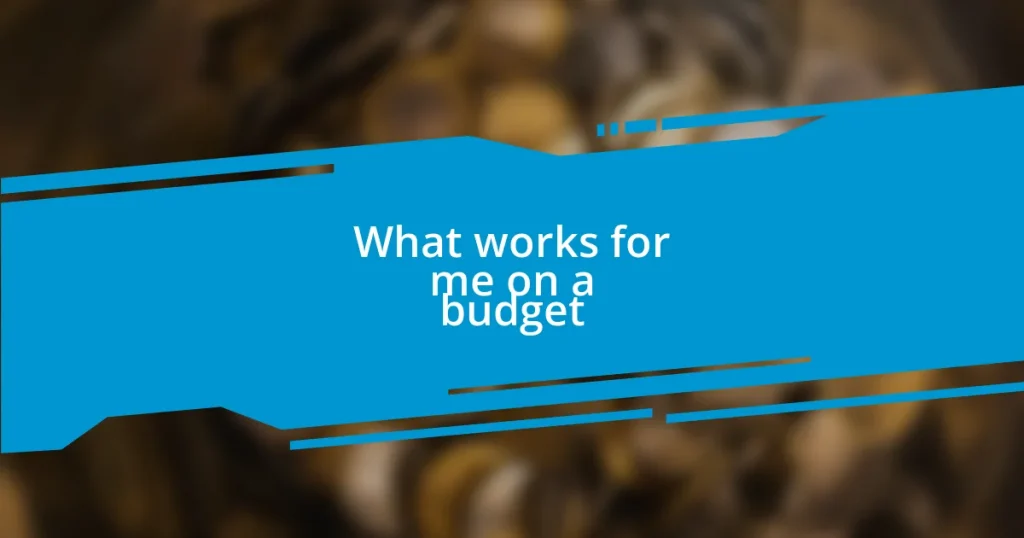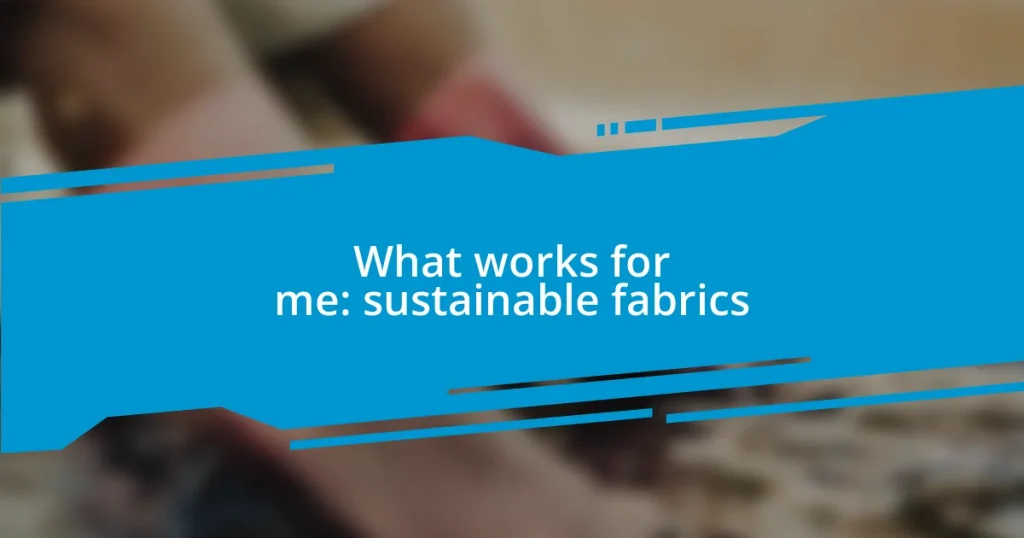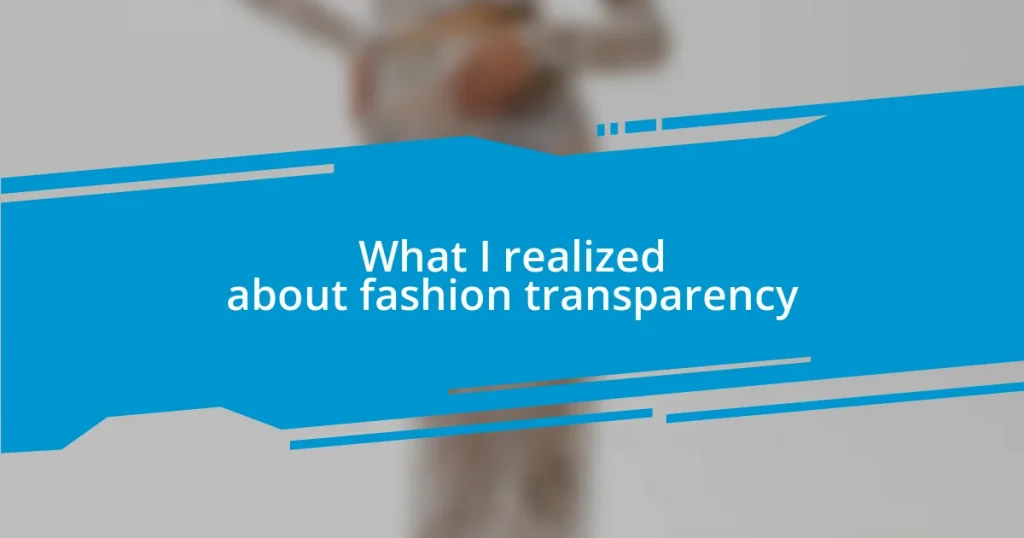Key takeaways:
- Embrace budget constraints as opportunities for creativity and prioritize essential needs to gain control over finances and enhance well-being.
- Utilize effective budgeting techniques, such as setting spending limits and using tools like zero-based budgeting and budgeting apps, to achieve financial clarity.
- Regularly review and adjust your budget to reflect changing financial situations, ensuring your spending aligns with your goals and passions.
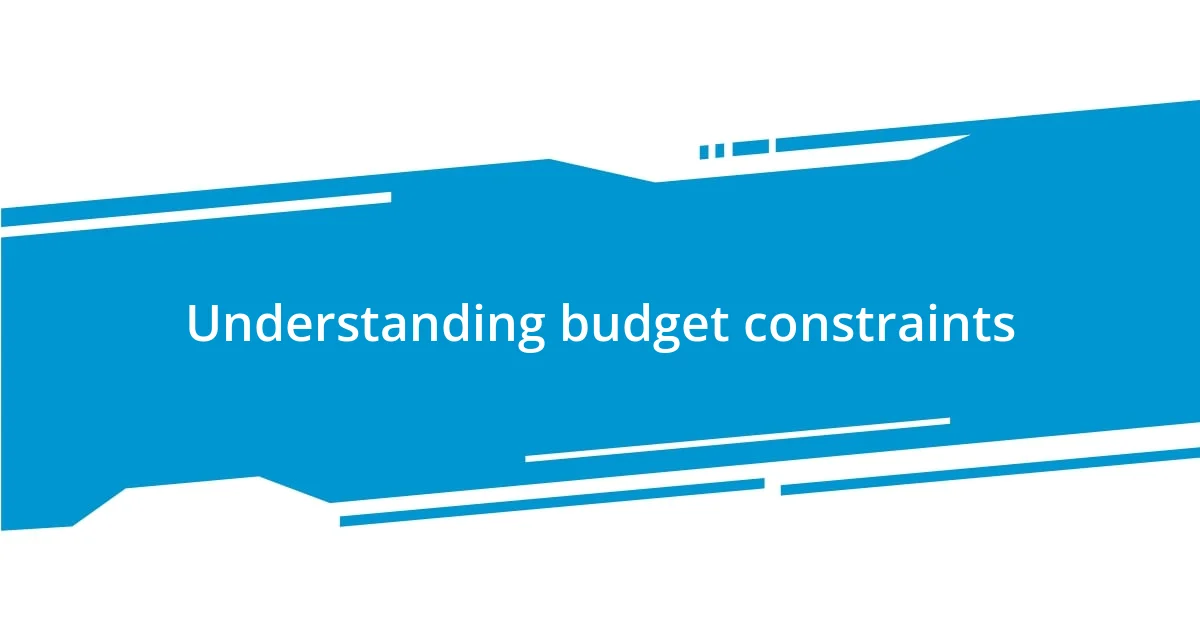
Understanding budget constraints
When I first started managing my finances, understanding budget constraints felt overwhelming. I remember staring at my expenses each month, wondering how to make ends meet while still treating myself. It’s a balancing act, isn’t it? You want to enjoy life, but staying within your limits can often feel like a tightrope walk.
I’ve often found myself in situations where unexpected expenses pop up, leaving me scrounging for funds. For instance, when my car broke down and I had to dip into my carefully saved vacation fund, it really hit home how fragile my budget could be. It’s those moments that remind us budgeting isn’t just about numbers; it’s an emotional journey that can sometimes lead to stress or even anxiety.
I’ve learned to embrace these constraints as opportunities for creativity. Instead of feeling restricted, I now see them as a chance to explore innovative solutions—like trying out a new recipe instead of dining out. Isn’t it enlightening to find ways to enjoy life while also being mindful of your budget? It shifts the perspective and opens up new avenues for fun and fulfillment.
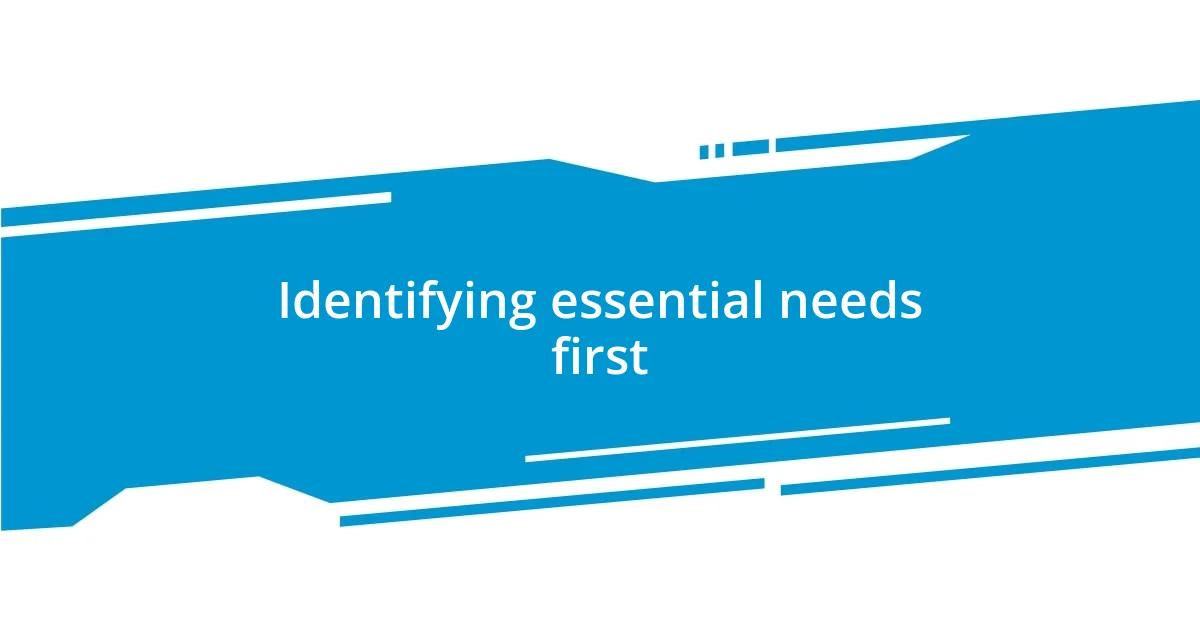
Identifying essential needs first
When I started to budget effectively, I quickly realized the importance of identifying my essential needs first. For me, that meant cutting through the clutter of wants and focusing on the foundational items: housing, food, transportation, and healthcare. I remember a time when I allowed subscription services and impulse buys to dictate my spending. It was liberating to prioritize essentials; it felt like lifting a weight off my shoulders.
Understanding what truly matters to me has been an eye-opener. I began tracking my expenses and noticed how often I indulged in things I didn’t really need. One month, I examined my grocery bill and discovered I was purchasing snacks I could easily forgo. By redirecting that money toward nourishing meals, I not only saved but also improved my health. It’s fascinating how this shift towards essentials can bring clarity to your overall financial picture.
As I streamlined my spending, I found myself more at ease with my finances. I recall one evening when I prepared a simple yet delicious meal at home instead of dining out. It brought me joy because I wasn’t just saving money; I was investing in my well-being. This approach empowers me, reminding me that budgeting isn’t just about restrictions—it’s about making choices that align with my priorities.
| Essential Needs | Examples |
|---|---|
| Housing | Rent, mortgage |
| Food | Groceries, basic nutrition |
| Transportation | Public transit, gas |
| Healthcare | Insurance, essential medications |
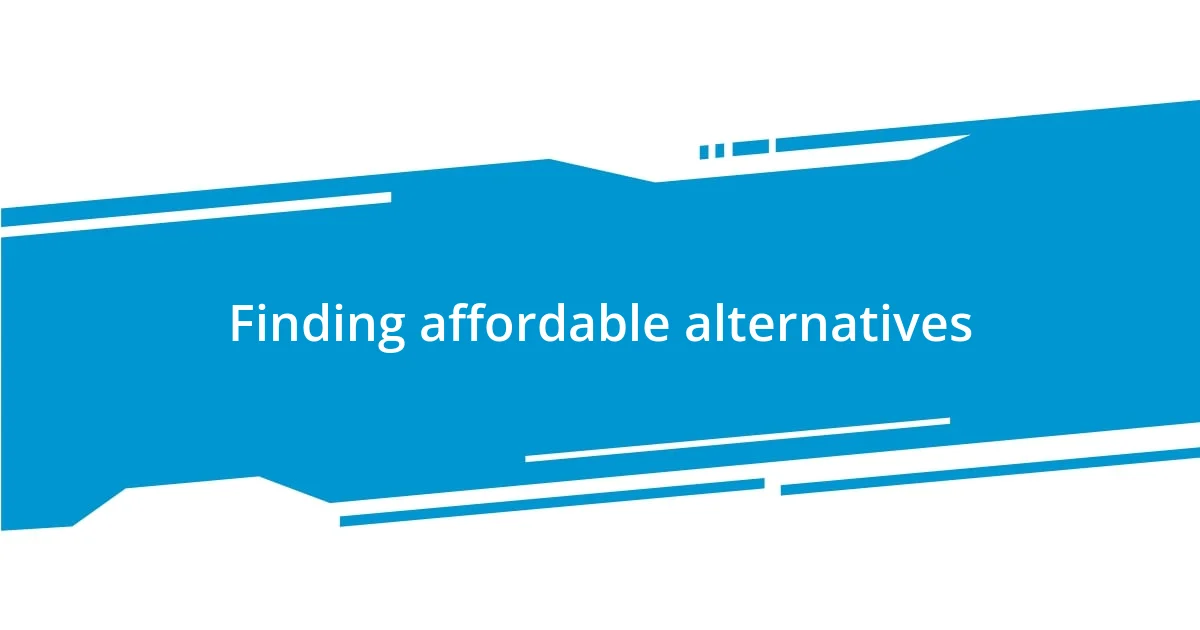
Finding affordable alternatives
Finding affordable alternatives can transform your budget while still allowing you to enjoy life. I remember the thrill of discovering a thrift store nearby; it felt like unearthing hidden treasures. Instead of splurging on new clothes, I started to embrace second-hand shopping, where I found quality pieces for a fraction of the price. It became a game for me—how could I creatively piece together outfits without breaking the bank? It not only saved me money but also made me more conscious of my consumption habits.
- Buy used textbooks instead of new ones; platforms like ThriftBooks and eBay can save significant amounts.
- Substitute expensive beauty products with DIY remedies; for example, using honey and sugar as a natural exfoliant.
- Attend community events instead of pricey outings; local libraries often host free workshops or activities.
- Opt for bulk buying when shopping for staples; it’s often cheaper and reduces the frequency of shopping trips.
Finding alternatives often requires a shift in mindset. I used to think that affordable meant sacrificing quality, but I’ve learned that’s not necessarily true. One memorable experience was swapping my regular coffee shop habit for making coffee at home. I invested in a good coffee maker and explored different beans. Not only did I save money, but I also created a cozy coffee moment in my mornings that truly felt special. This simple change made me appreciate my morning routine in a refreshing way.
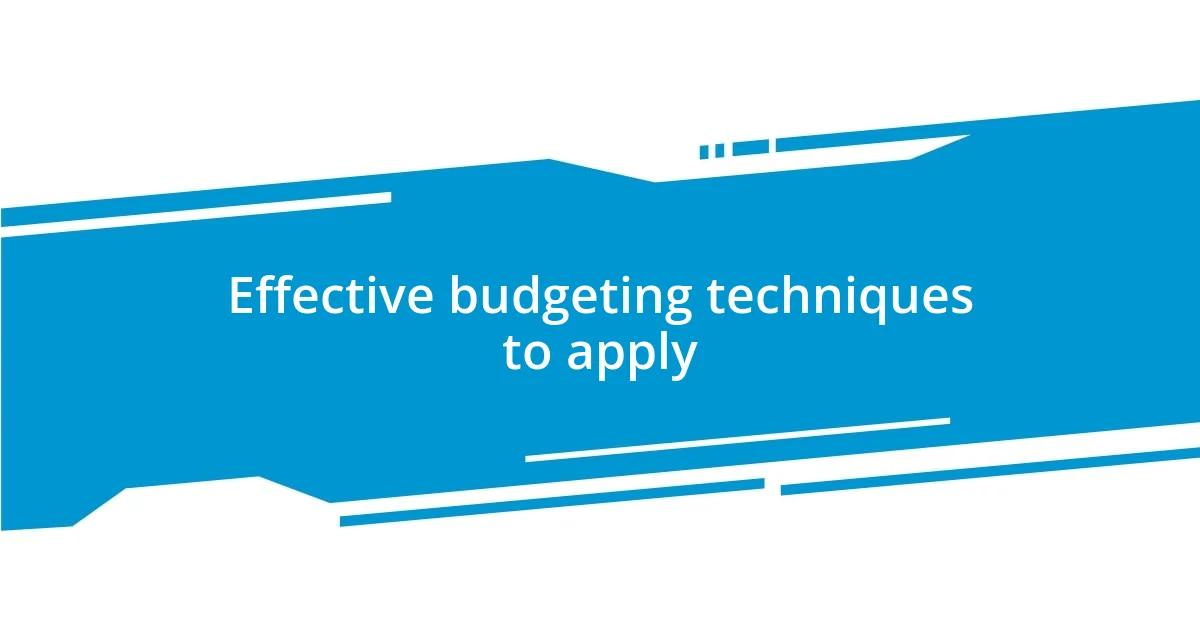
Effective budgeting techniques to apply
When it comes to effective budgeting techniques, one strategy I’ve found invaluable is setting specific spending limits. A few years back, I decided to cap my monthly dining out budget. At first, it felt restrictive, but it quickly transformed my approach to meals. I began seeking out new recipes and even started hosting dinner parties at home. Not only did I save money, but I also discovered a love for cooking that I never knew I had. Isn’t it amazing how a little constraint can unlock a new passion?
Another effective technique is the use of zero-based budgeting. This method involves assigning every dollar a job—from savings to discretionary spending—leaving no room for unexpected expenses to throw me off. I recall the first time I tried this approach; I meticulously planned out my budget down to the last cent. Surprisingly, I felt more in control and less anxious about my finances. It became clear to me that knowing where my money went brought a sense of calm to my life. Have you ever experienced that thrilling moment when you know exactly where your finances stand?
Additionally, I can’t stress enough the power of a budgeting app or a simple spreadsheet. I initially resisted using technology to manage my budget, thinking it would complicate things further. But once I started tracking my expenses digitally, the insights I gained were eye-opening. I vividly recall a week when I noticed a significant portion of my spending was on takeout. By visualizing where my money went in real-time, I adjusted my habits, leading to both healthier meals and an extra boost to my savings. It’s like having a financial GPS guiding me through potential pitfalls—doesn’t that sound beneficial?
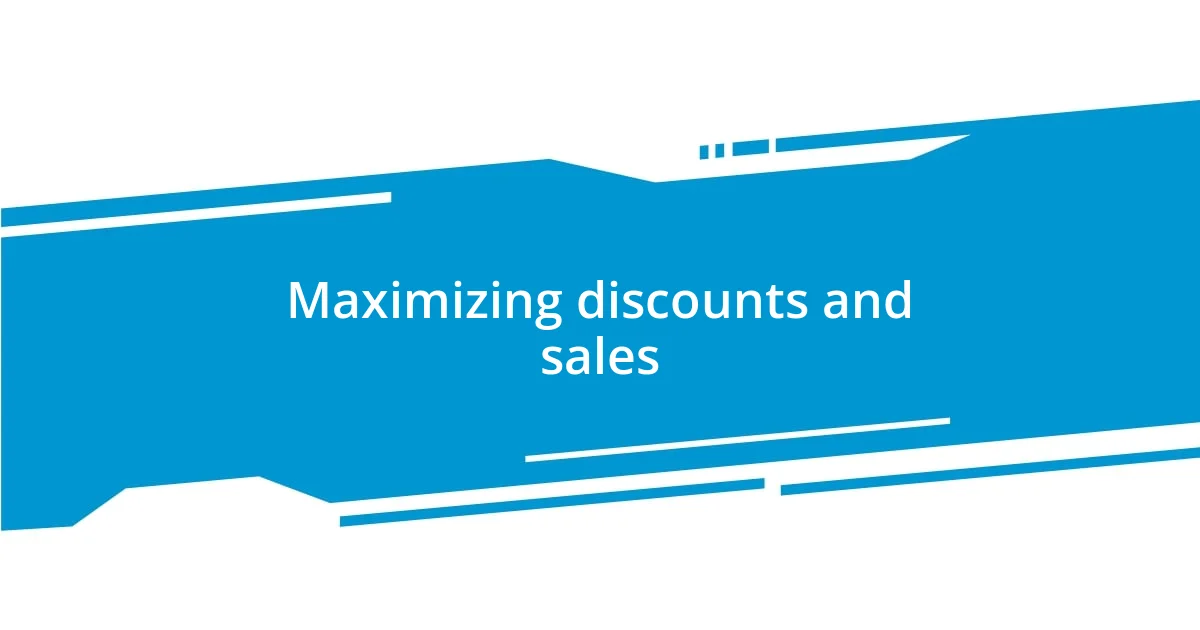
Maximizing discounts and sales
When it comes to maximizing discounts and sales, I’ve learned that timing is everything. I remember the rush I felt last year when I coordinated my holiday shopping with seasonal sales. By planning ahead and tracking store promotions, I managed to score a major discount on gifts I had my eye on for months. It’s exhilarating to see the savings stack up, isn’t it? It gives a satisfying sense of achievement, knowing I put in the effort to stretch my dollar further.
Take advantage of loyalty programs and sign up for newsletters—these can be goldmines for exclusive discounts. Just the other day, I received an email warning me about a flash sale on a favorite brand, which offered an additional percentage off for subscribers. The thrill of getting that extra deal made it feel like a personal victory. Have you ever pondered what opportunities you might miss out on by not staying connected with your favorite stores?
Don’t forget about apps and websites that compare prices or notify you of upcoming sales. I can’t help but think back to a time when I was hesitant to download yet another app. However, the first time I used a price comparison tool, I instantly found a better deal on a gadget I wanted. The rush of discovering savings in real-time felt rewarding! It truly changed the way I shop, as I realized that a little tech savvy goes a long way in maximizing every dollar spent.
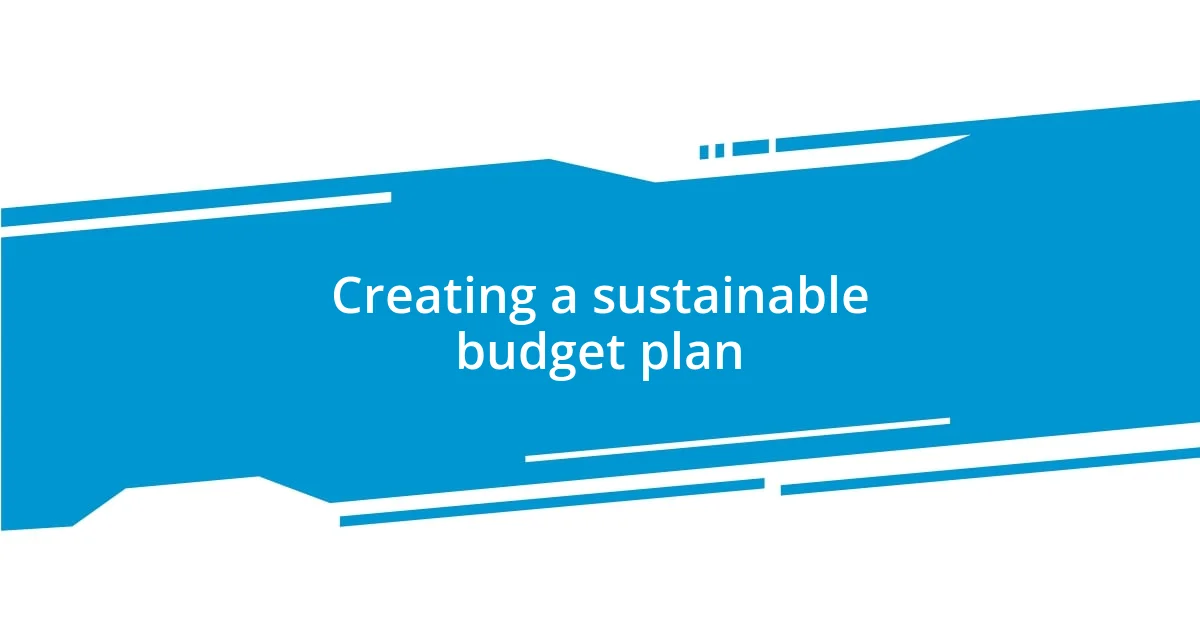
Creating a sustainable budget plan
Creating a sustainable budget plan requires a clear understanding of your financial habits and goals. I remember the moment I realized I needed to prioritize savings to reach my long-term goals like a vacation and a new car. Diving deep into my expenses was eye-opening; it made me confront my impulse purchases head-on. Have you ever taken a hard look at what you spend on “wants” versus essentials?
One of the most transformative steps I took was establishing an emergency fund. At first, it felt daunting—how could I save when there seemed to be so many expenses? But I decided to allocate a small percentage of my income month after month, and slowly but surely, the fund grew. The sense of security that came with having that cushion was incredible. It’s like having an invisible safety net; have you thought about how an emergency fund could change your financial outlook?
Regularly reviewing and adjusting your budget is essential to create a budget plan that truly works for you. I’ve made it a habit to revisit my budget every few months, and every time, I discover areas where I can improve. Recently, I realized I was spending less on transportation than I had budgeted, which allowed me to invest in a few more luxuries like a therapy session or a movie night. It became clear to me that flexibility is crucial. Isn’t it liberating to know you can adapt your budget to reflect your current lifestyle?
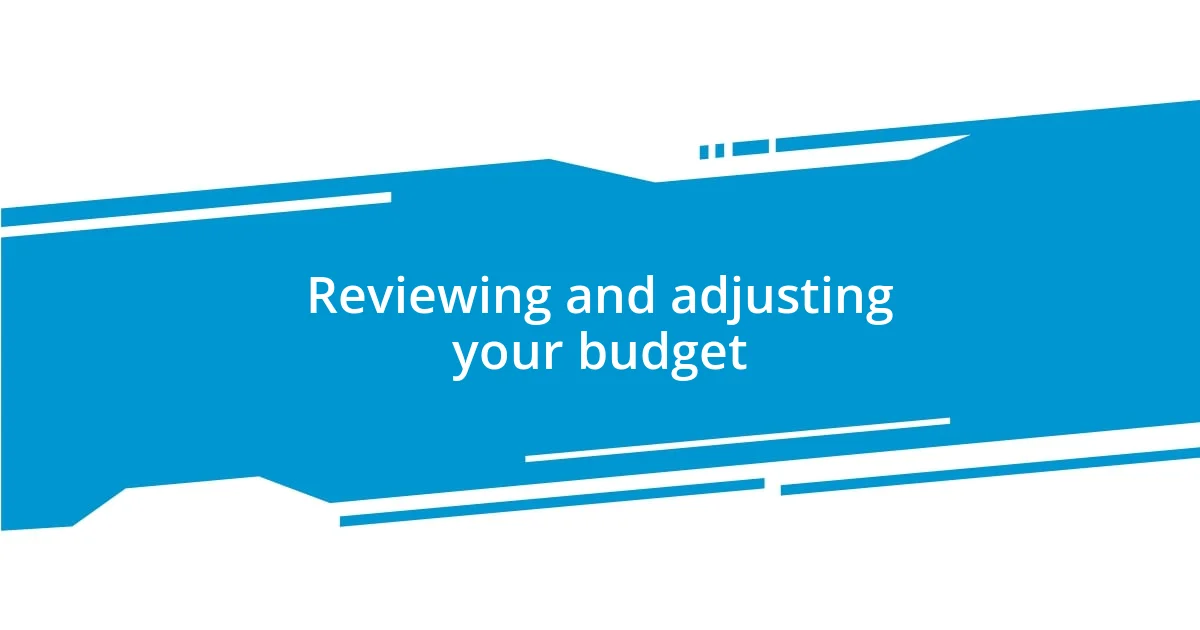
Reviewing and adjusting your budget
I can’t stress enough how impactful regular budget reviews can be on my financial journey. Each time I sit down to assess my spending, it feels like I’m recalibrating my financial compass. A recent review revealed that I had an unexpected surplus from one month due to a canceled event. Instead of letting that extra cash slip away, I redirected it towards my savings goal for a weekend getaway. Don’t you love the feeling of taking control like that?
Adjusting your budget isn’t just about numbers; it’s a reflection of your evolving life circumstances. A few months ago, I switched jobs, which came with a change in my income and expenditures. Initially, I was apprehensive about how that would affect my budgeting. But by reassessing my priorities and reallocating funds from my daily coffee runs to savings, I created a budget that fit my new lifestyle seamlessly. How has your budget shifted with different phases of your life?
I find that emotional insights from these reviews are powerful motivators. There’s a sense of empowerment in knowing that I can tweak my budget to prioritize what truly brings joy into my life. For instance, I discovered that cutting back on dining out allowed me to indulge in monthly classes for something I love—painting! Isn’t it fascinating how a few small changes can align your finances with your passions? Every adjustment I make not only improves my financial health but also enriches my daily life in unexpected ways.










